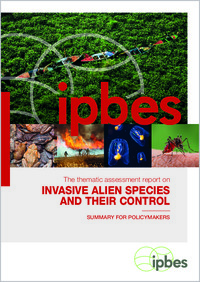Summary for Policymakers of the Thematic Assessment Report on Invasive Alien Species and their Control
DOKPE
- Roy, Helen ORCID Centre for Ecology & Hydrology Wallingford, UK
- Pauchard, Anibal ORCID Universidad de Concepción, Chile
- Stoett, Peter ORCID Ontario Tech University, Canada
- Renard Truong, Tanara ORCID IPBES Technical support unit for the assessment of invasive alien species, Japan
- Bacher, Sven ORCID University of Fribourg
- Galil, Bella ORCID Tel Aviv University, Israel
- Hulme, Philip ORCID Lincoln University, New Zealand
- Ikeda, Toruh ORCID Hokkaido University, Japan
- Sankaran, K.V. ORCID Kerala Forest Research Institute, India
- McGeoch, Melodie ORCID La Trobe University, Melbourne, Victoria, Australia
- Meyerson, Laura ORCID University of Rhode Island, Kingston, RI, US
- Nunez, Martin ORCID University of Houston, Texas, US
- Ordonez, Alejandro ORCID Aarhus University, Denmark
- Rahlao, Sebatolo ORCID Ezemvelo KZN Wildlife, South Africa
- Schwindt, Evangelina ORCID Instituto de Biología de Organismos Marinos (IBIOMAR-CONICET), Argentina
- Seebens, Hanno ORCID Senckenberg Biodiversity and Climate Research Centre, Germany
- Sheppard, Andrew ORCID CSIRO, Australia
- Vandvik, Vigdis ORCID University of Bergen, Norway
- Zenodo, 2023
Published in:
- IPBES Invasive Alien Species Assessment. - 2023, p. 1-56
English
The Invasive Alien Species Assessment explores how invasive alien species affect nature and people globally. It analyzes the status and trends of alien and invasive alien species in all regions of Earth, and identifies major pathways for and drivers of the introduction and spread of such species between and within countries. The Assessment also assesses the effectiveness of management actions across scales and in various contexts. The Invasive Alien Species Assessment finally outlines key responses and policy options for the prevention, early detection, and effective control of invasive alien species and mitigation of their impacts in order to safeguard nature, nature’s contributions to people, and good quality of life.
The Invasive Alien Species Assessment highlights that invasive alien species are a major and growing threat to nature, nature’s contributions to people, with, in some cases, irreversible changes to biodiversity and ecosystems. Invasive alien species also dramatically impact the economy, food security, water security, and human health, sometimes adding to marginalization and inequity. The Assessment demonstrates that with sufficient resources, political will, and long-term commitment, preventing and controlling invasive alien species are attainable goals that will yield significant long-term benefits for people and nature.
The Invasive Alien Species Assessment highlights that invasive alien species are a major and growing threat to nature, nature’s contributions to people, with, in some cases, irreversible changes to biodiversity and ecosystems. Invasive alien species also dramatically impact the economy, food security, water security, and human health, sometimes adding to marginalization and inequity. The Assessment demonstrates that with sufficient resources, political will, and long-term commitment, preventing and controlling invasive alien species are attainable goals that will yield significant long-term benefits for people and nature.
- Faculty
- Faculté des sciences et de médecine
- Department
- Département de Biologie
- Language
-
- English
- Classification
- Biology, life sciences
- License
- Open access status
- gold
- Identifiers
-
- DOI 10.5281/zenodo.7430692
- ISBN 9783947851355
- Persistent URL
- https://folia.unifr.ch/unifr/documents/327751
Statistics
Document views: 643
File downloads:
- summaryforpolicymakers_ipbesiasassessment: 526
